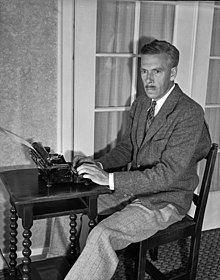Harold Lamb
| Harold Lamb | ||
|---|---|---|
 | ||
| Información personal | ||
| Nacimiento |
1 de septiembre de 1892 Alpine, Nueva Jersey | |
| Fallecimiento |
9 de abril de 1962 Rochester, New York | |
| Nacionalidad | Estados Unidos | |
| Educación | ||
| Educado en | Universidad de Columbia | |
| Información profesional | ||
| Ocupación | Escritor, historiador, guionista | |
| Años activo | siglo XX | |
| Géneros | Novela, biografía | |
| Distinciones |
| |
Harold Albert Lamb (Alpine, Nueva Jersey, 1892 - Rochester, New York, 9 de abril de 1962) fue un historiador, novelista y guionista de cine estadounidense.
Se crio en el estado de Nueva Jersey y asistió a la Universidad de Columbia, donde se interesó por la historia de Asia. Su trabajo se hizo conocido a través de la revista Adventure, donde escribió desde los diecinueve años. El éxito de su biografía de Gengis Kan en 1927 lo convirtió en un reconocido biógrafo de personajes históricos: Tamerlán (1928), Omar Jayyam (1934), Alejandro Magno (1946), Solimán el Magnífico (1951), Carlomagno (1954), Aníbal (1958) y Ciro, el grande (1960).
Hablaba francés, latín, persa y árabe. Sus investigaciones lo llevaron a recorrer Asia e incluir descripciones precisas de la geografía y las costumbres de la Tartaria y el Irán. Su libro Omar Jayyam fue dedicado a los persas que compartieron sus hogares con él.[1] Su libro Ciro, el grande fue el resultado de una investigación casual del autor durante su servicio en la Segunda Guerra Mundial.[2]
Trabajó como guionista de Hollywood desde 1935, cuando escribió Las cruzadas, de Cecil B. DeMille, con quien colaboraría en otras cuatro películas.
Libros en castellano[editar]
- Genghis Khan, emperador de todos los hombres. Alianza, 1985. ISBN 84-206-0130-6
- Carlomagno. Edhasa, 1991. ISBN 84-350-0572-0
- Ciro, el grande. Edhasa, 1992. ISBN 84-350-0574-7
- Omar Khayyam. Editorial Sudamericana, Argentina, 1967.
- Omar Khayyam. Apóstrofe, 1996. ISBN 84-455-0123-2
- La marcha de los bárbaros. Editorial Sudamericana,1963.
- Nur Mahal. Editorial Sudamericana, 1947.
- Tamerlán, el conquistador. Ediciones Jasón, México, 1953.
- Soleimán el Magnífico. Ed. Grijalbo, México, 1957.
- Alejandro de Macedonia (El viaje al fin del mundo). Ed. Espuela de Plata, Salamanca 2010.ISBN 84-15177-03-6
Obra[editar]
Ficción[editar]
- Marching Sands (1920)
- The House of the Falcon (1921)
- The Grand Cham (1922)
- White Falcon (1926)
- Durandal (1931)
- Nur Mahal (1932)
- Kirdy (1933)
- A Garden to the Eastward (1947)
- The Curved Saber (1964)
- The Mighty Manslayer (1969)
- The Three Palladins (1977)
- Durandal (1981)
- The Sea of the Ravens (1983)
- Wolf of the Steppes (2006)
- Warriors of the Steppes (2006)
- Riders of the Steppes (2007)
- Swords of the Steppes (2007)
No ficción[editar]
- Genghis Khan: The Emperor of All Men (1927)
- Tamerlane (1928)
- The Flame of Islam (1930)
- Iron men and Saints (1930)
- The Crusades (1931)
- Omar Khayyam (1934)
- The March of the Barbarians (1940)
- Alexander of Macedon: The Journey to World's End (1946)
- The march of Muscovy: Ivan the Terrible and the Growth of the Russian Empire, 1400-1648 (1948)
- The city and the Tsar: Peter the Great and the Move to the West, 1648-1762 (1948)
- The Earth Shakers (1949)
- Suleiman the Magnificent (1951)
- Theodora and the Emperor: The Drama of Justinian (1952)
- Charlemagne: The Legend and the Man (1954)
- Genghis Khan and the Mongol Horde (1954)
- New Found World: How North America Was Discovered and Explored (1955)
- Hannibal: One Man Against Rome (1958)
- Constantinople: Birth of an empire (1958)
- Chief of the Cossacks(1959)
- Cyrus the Great (1960)
- Babur the Tiger: First of the Great Moguls (1962)
Cine[editar]
- The Crusades (1935)
- The Plainsman (1936)
- The Buccaneer (1938)
- Samson and Delilah (1949)
- The Golden Horde (1951)
Notas[editar]
Enlaces externos[editar]
- Harold Lamb en Internet Movie Database (en inglés).
- Frases célebres de Harold Lamb
